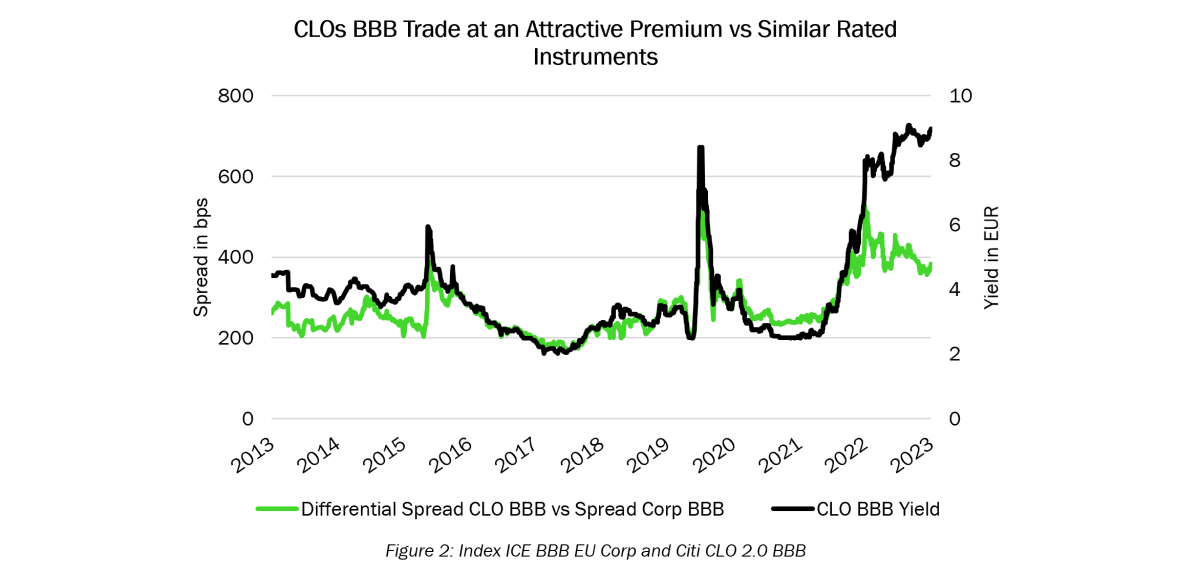Articles & Interviews
2 November 2023
European Structured Credit: an Attractive Risk-Reward in a Weakening Environment
What is a CLO?
Collateralised loan obligations (CLOs) offer investors many potential benefits, including diversification, structural protections, low sensitivity to interest rate increases, and higher average yields than similarly rated traditional fixed income.
Indeed, CLOs are actively managed securitisations backed primarily by a pool of 150-300 BB and single B rated issuers’ senior secured loans and bonds.
CLOs are also primarily floating-rate products and are typically issued to take advantage of the funding gap between asset yields (e.g. loan spreads) and liability costs (e.g. CLO tranche spreads).
Finally, CLOs are structured with a number of debt tranches – typically rated AAA down to single-B – as well as an equity tranche. Interest or principal payments are made first to the most senior bonds, and residual interest cash flow, if available, can be passed to the equity tranche. Conversely, losses in the collateral pool of loans are first absorbed by the most junior tranches, meaning the equity tranche would receive first losses.
Historical CLO Tranche Impairment (Default) Rates?
Most BBB CLOs are structured with 20% credit enhancement, which means that 20% of the collateral pool would have to default at a 0% recovery rate for a BBB tranche to take a principal loss. Regarding BBB Euro CLO, this scenario has historically never happened (as per table below).

Why are European BBB CLOs Attractive in the Current Market Environment?
As mentioned above we tend to favour investments in the BBB tranches for several reasons:
1. Strong credit protection against collateral pool defaults.
2. Attractive valuations vs similar rated corporate. In our view the spread premium is more than compensating investors for the credit risk taken in CLO securitisation.
3. Attractive total returns: almost 9% yield in Euro with Euribor 3M now sitting at 4%.

How are the Fundamentals?
We are heading into an economic slowdown with strong fundamentals for European corporate issuers which should effectively mitigate the risk of loan defaults. Notably, HY European issuers have recently managed to reduce leverage and strengthen their balance sheet in response to the post-COVID surge in demand. An active management (a characteristic inherent in current CLOs structure) is however required as the high inflation environment is expected to exert pressure on profit margins, while rising interest rates will increase borrowing costs.
Vincent Ollivier
Credit Portfolio Manager
___________________
Disclaimer
The figures, comments, opinions and/or analyses contained herein reflect the sentiment of RAM with respect to market trends based on its expertise, economic analyses and the information in its possession at the date on which this document was drawn up and may change at any time without notice. They may no longer be accurate or relevant at the time of reading, owing notably to the publication date of the document or to changes on the market.
This document is intended solely to provide general and introductory information to the readers, and notably should not be used as a basis for any decision to buy, sell or hold an investment. Under no circumstances may RAM be held liable for any decision to invest, divest or hold an investment taken on the basis of these comments and analyses.
RAM therefore recommends that investors obtain the various regulatory descriptions of each financial product before investing, to analyse the risks involved and form their own opinion independently of RAM. Investors are advised to seek independent advice from specialist advisors before concluding any transactions based on the information contained in this document, notably in order to ensure the suitability of the investment with their financial and tax situation.
Past performance and volatility are not a reliable indicator of future performance and volatility and may vary over time, and may be independently affected by exchange rate fluctuations.
